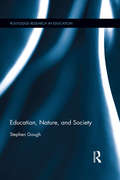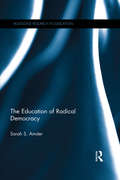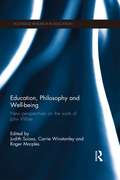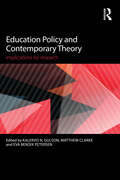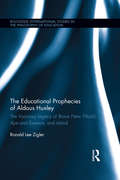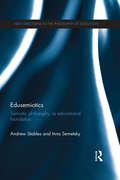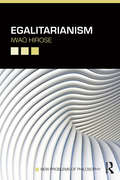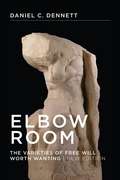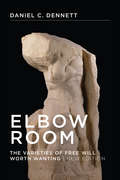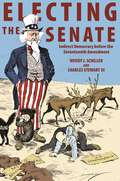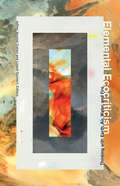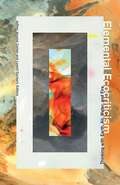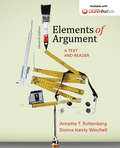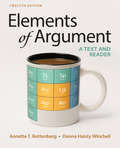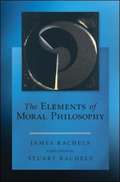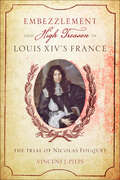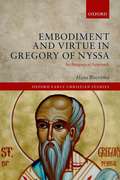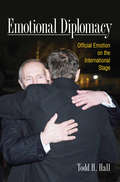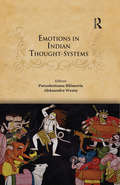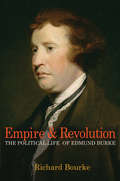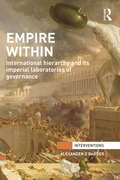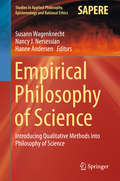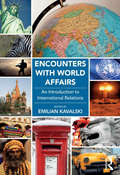- Table View
- List View
Education, Nature, and Society (Routledge Research in Education)
by Stephen GoughEnvironmental issues continue to divide opinion, sometimes in extreme ways. Almost everyone agrees that education has a role to play in ensuring the future of humanity on Earth. Some think we should all learn to leave a minimal environmental footprint; others argue that education should promote economic growth, because only growth can generate the capital needed to develop solutions to environmental problems. Advocates on each side often find the views of their opponents simply incredible, giving rise to accusations of bad faith or poor science. This book explores the foundations of the debate by examining human interrelations with Nature. It takes an educational perspective, but also draws on evidence from anthropology, economics, ecology, policy sciences and natural history. The case presented is that any coherent view of the purposes and potential of education requires a theory of human society in the natural world. For such a theory, education (and, more broadly, learning) must be more than an instrument for the achievement of personal or policy goals. Rather, it is an integral, continuing and necessary component of personal and policy development. On this basis, a novel approach to curriculum design and implementation is outlined.
The Education of Radical Democracy (Routledge Research in Education)
by Sarah S. AmslerThe Education of Radical Democracy explores why radical democracy is so necessary, difficult, and possible and why it is important to understand it as an educative activity . The book draws on critical social theory and critical pedagogy to explain what enables and sustains work for radical democratization, and considers how we can begin such work in neoliberal societies today. Exploring examples of projects from the nineteenth century to the present day, the book sheds light on a wealth of critical tools, research studies, theoretical concepts and practical methods. It offers a critical reading of the ‘crisis of hope’ in neoliberal capitalist societies, focusing on the problem of the ‘contraction of possibilities’ for democratic agency, resistance to domination, and practices of freedom. It argues that radically democratic thinking, practice, and forms of social organization are vital for countering and overcoming systemic hegemonies and that these can be learned and cultivated. This book will be of interest to academics, practitioners, researchers, and students in education and critical theory, and to those interested in the sociology, philosophy and politics of hope. It also invites new dialogues between theorists of neoliberal power and political possibility, those engaged in projects for radical democratization, and teachers in formal and informal educational settings.
Education, Philosophy and Well-being: New perspectives on the work of John White (Routledge Research in Education)
by Judith Suissa Carrie Winstanley Roger MarplesJohn White is one of the leading philosophers of education currently working in the Anglophone world. Since first joining the London Institute of Education in 1965, he has made significant contributions to the landscape of the discipline through his teaching, research and numerous publications. His academic work encompasses a broad range of rich philosophical issues, ranging from questions surrounding the child’s mind, through the moral and pedagogical obligations of teachers and schools, to local and national questions of educational policy. In this volume, international contributors address key issues in the philosophy of education, touching on significant contemporary concerns and demonstrating the breadth and influence of John White’s work. Each chapter critically examines, builds on, and pays tribute to John White’s unique contribution, considering how his work has impacted on the discipline of education as we know it today. Topics covered include: policy and the role of philosophy of education liberal education the aims of education moral education leadership. Education, Philosophy and Wellbeing will appeal to postgraduate students and academics in the fields of history, policy, education studies, and philosophy, as well as to policy-makers, educational administrators and teachers.
Education Policy and Contemporary Theory: Implications for research
by Matthew Clarke Eva Bendix Petersen Kalervo N. GulsonThis book aims to posit theory as a central component to the study of education and education policy. Providing clear, introductory entries into contemporary critical theories and their take up in education policy studies, the book offers a generative invitation to further reading, thought and exploration. Instead of prescribing how theory should be used, the contributors elaborate on a set of possibilities for researching and critiquing education policy. Education Policy and Contemporary Theory explores examples of how theoretical approaches generate a variety of questions for policy analysis, demonstrating the importance of theory as a necessary and inevitable resource for exploring and contesting various policy realms and dominant discourses. Each chapter provides a short overview of key aspects of a particular theory or perspective, followed by suggestions of methodological implications and recommended readings to extend the outlined ideas. Organized around two parts, the first section focuses on theorists while the second section looks at specific theories and concepts, with the intention that each part makes explicit the connection between theory and methodology in relation to education policy research. Each contribution is carefully written by established and emerging scholars in the field to introduce new scholars to theoretical concepts and policy questions, and to inspire, extend or challenge established policy researchers who may be considering working in new areas.
The Educational Prophecies of Aldous Huxley: The Visionary Legacy of Brave New World, Ape and Essence and Island (Routledge International Studies in the Philosophy of Education)
by Ronald ZiglerThe visionary legacy of Aldous Huxley is as relevant today as ever. Huxley possessed a sober understanding of the human condition as well as an inspired vision of the human potential. This volume presents an interdisciplinary examination and appreciation of Aldous Huxley’s three visionary novels – Brave New World (1932), Ape and Essence (1948), and Island (1962) – to reveal the extent to which Huxley’s prognoses into our possible futures was prophetic. The author assesses each novel to reveal the foresights that define our current educational, social, religious, political, and economic institutions, while also exposing our conflicts within those institutions. This volume examines the educational, cultural and technological changes that have shaped our society since Huxley’s work, with special reference to the enduring legacy of educational philosopher John Dewey. It offers profound insights into the educational forces and moral foundations of our society that shape us, both inside and outside of our schools. It is the first of its kind to focus exclusively on all three of Huxley’s visionary novels and detail their relevance to our world today.
Edusemiotics: Semiotic philosophy as educational foundation (New Directions in the Philosophy of Education #64)
by Inna Semetsky Andrew StablesEdusemiotics addresses an emerging field of inquiry, educational semiotics, as a philosophy of and for education. Using "sign" as a unit of analysis, educational semiotics amalgamates philosophy, educational theory and semiotics. Edusemiotics draws on the intellectual legacy of such philosophers as John Dewey, Charles Sanders Peirce, Gilles Deleuze and others across Anglo-American and continental traditions. This volume investigates the specifics of semiotic knowledge structures and processes, exploring current dilemmas and debates regarding self-identity, learning, transformative and lifelong education, leadership and policy-making, and interrogating an important premise that still haunts contemporary educational philosophy: Cartesian dualism. In defiance of substance dualism and the fragmentation of knowledge that still inform education, the book offers a unifying paradigm for education as edusemiotics and emphasises ethical education in compliance with the semiotic unity between knowledge and action. Chapters contain accessible discussions in the context of educational philosophy and theory, crossing the borders between logic, art, and science together with a provocative theoretical critique. Recently awarded a PESA book award for its contribution to the philosophy of education, Edusemiotics will appeal to an academic readership in education, philosophy and cultural studies, while also being an inspiring resource for students.
Egalitarianism (New Problems of Philosophy)
by Iwao HiroseSome people are worse off than others. Does this fact give rise to moral concern? Egalitarianism claims that it does, for a wide array of reasons. It is one of the most important and hotly debated problems in moral and political philosophy, occupying a central place in the work of John Rawls, Thomas Nagel, G. A. Cohen and Derek Parfit. It also plays an important role in practical contexts such as the allocation of health care resources, the design of education and tax systems, and the pursuit of global justice. Egalitarianism is a superb introduction to the problem of contemporary egalitarian theories. It explains how rival theories of egalitarianism evaluate distributions of people’s well-being, and carefully assesses the theoretical structure of each theory. It also examines how egalitarian theories are applied to the distribution of health and health care, thus bringing a deceptively complex philosophical debate into clear focus. Beginning with a brief introduction to basic terminology, Iwao Hirose examines the following topics: Rawlsian egalitarianism luck egalitarianism telic egalitarianism prioritarianism sufficientarianism equality and time equality in health and health care. Including chapter summaries, annotated further reading and a glossary, this is an ideal starting point for anyone studying distributive justice for the first time, and will also be of interest to more advanced students and researchers in philosophy, economics, political theory, public policy, and public health.
Elastic Language
by Grace Q. ZhangElastic language carries non-specific and stretchable meaning, as in 'He loves her, kind of'. It is used like a slingshot, targeting various strategic goals. Consolidating current research and charting new directions, this book develops a refreshing theory of elasticity, empirically attested by natural language data from tension-prone encounters between Australian Customs officers and passengers. The theory proposes three principles (fluidity, stretchability and strategy) and offers a systematic look at how elastic language, as a sliding scale, works to balance strengthening and weakening speech tones, to firm and soften a speaker's stance, and to reveal and evade the truth. The comparative analysis of forms, functions, and context confirms that elastic language is fluid, stretchable, and strategic. It serves both cooperative and competitive functions, and social and speech factors impact on its use. This book will appeal to students and researchers working in pragmatics, applied linguistics, sociolinguistics, discourse analysis, and communication.
Elbow Room
by Daniel C. DennettIn this landmark 1984 work on free will, Daniel Dennett makes a case for compatibilism. His aim, as he writes in the preface to this new edition, was a cleanup job, "saving everything that mattered about the everyday concept of free will, while jettisoning the impediments. " In Elbow Room, Dennett argues that the varieties of free will worth wanting -- those that underwrite moral and artistic responsibility -- are not threatened by advances in science but distinguished, explained, and justified in detail. Dennett tackles the question of free will in a highly original and witty manner, drawing on the theories and concepts of fields that range from physics and evolutionary biology to engineering, automata theory, and artificial intelligence. He shows how the classical formulations of the problem in philosophy depend on misuses of imagination, and he disentangles the philosophical problems of real interest from the "family of anxieties" in which they are often enmeshed -- imaginary agents and bogeymen, including the Peremptory Puppeteer, the Nefarious Neurosurgeon, and the Cosmic Child Whose Dolls We Are. Putting sociobiology in its rightful place, he concludes that we can have free will and science too. He explores reason, control and self-control, the meaning of "can" and "could have done otherwise," responsibility and punishment, and why we would want free will in the first place. A fresh reading of Dennett's book shows how much it can still contribute to current discussions of free will. This edition includes as its afterword Dennett's 2012 Erasmus Prize essay.
Elbow Room, new edition: The Varieties of Free Will Worth Wanting
by Daniel C. DennettA landmark book in the debate over free will that makes the case for compatibilism.In this landmark 1984 work on free will, Daniel Dennett makes a case for compatibilism. His aim, as he writes in the preface to this new edition, was a cleanup job, “saving everything that mattered about the everyday concept of free will, while jettisoning the impediments.” In Elbow Room, Dennett argues that the varieties of free will worth wanting—those that underwrite moral and artistic responsibility—are not threatened by advances in science but distinguished, explained, and justified in detail.Dennett tackles the question of free will in a highly original and witty manner, drawing on the theories and concepts of fields that range from physics and evolutionary biology to engineering, automata theory, and artificial intelligence. He shows how the classical formulations of the problem in philosophy depend on misuses of imagination, and he disentangles the philosophical problems of real interest from the “family of anxieties” in which they are often enmeshed—imaginary agents and bogeymen, including the Peremptory Puppeteer, the Nefarious Neurosurgeon, and the Cosmic Child Whose Dolls We Are. Putting sociobiology in its rightful place, he concludes that we can have free will and science too. He explores reason, control and self-control, the meaning of “can” and “could have done otherwise,” responsibility and punishment, and why we would want free will in the first place. A fresh reading of Dennett's book shows how much it can still contribute to current discussions of free will. This edition includes as its afterword Dennett's 2012 Erasmus Prize essay.
Electing the Senate: Indirect Democracy before the Seventeenth Amendment (Princeton Studies in American Politics: Historical, International, and Comparative Perspectives #146)
by Wendy J. Schiller Charles StewartHow U.S. senators were chosen prior to the Seventeenth Amendment—and the consequences of Constitutional reformFrom 1789 to 1913, U.S. senators were not directly elected by the people—instead the Constitution mandated that they be chosen by state legislators. This radically changed in 1913, when the Seventeenth Amendment to the Constitution was ratified, giving the public a direct vote. Electing the Senate investigates the electoral connections among constituents, state legislators, political parties, and U.S. senators during the age of indirect elections. Wendy Schiller and Charles Stewart find that even though parties controlled the partisan affiliation of the winning candidate for Senate, they had much less control over the universe of candidates who competed for votes in Senate elections and the parties did not always succeed in resolving internal conflict among their rank and file. Party politics, money, and personal ambition dominated the election process, in a system originally designed to insulate the Senate from public pressure.Electing the Senate uses an original data set of all the roll call votes cast by state legislators for U.S. senators from 1871 to 1913 and all state legislators who served during this time. Newspaper and biographical accounts uncover vivid stories of the political maneuvering, corruption, and partisanship—played out by elite political actors, from elected officials, to party machine bosses, to wealthy business owners—that dominated the indirect Senate elections process. Electing the Senate raises important questions about the effectiveness of Constitutional reforms, such as the Seventeenth Amendment, that promised to produce a more responsive and accountable government.
Elemental Ecocriticism: Thinking with Earth, Air, Water, and Fire
by Jeffrey Jerome Cohen Lowell DuckertFor centuries it was believed that all matter was composed of four elements: earth, air, water, and fire in promiscuous combination, bound by love and pulled apart by strife. Elemental theory offered a mode of understanding materiality that did not center the cosmos around the human. Outgrown as a science, the elements are now what we build our houses against. Their renunciation has fostered only estrangement from the material world. The essays collected in Elemental Ecocriticism show how elemental materiality precipitates new engagements with the ecological. Here the classical elements reveal the vitality of supposedly inert substances (mud, water, earth, air), chemical processes (fire), and natural phenomena, as well as the promise in the abandoned and the unreal (ether, phlogiston, spontaneous generation). Decentering the human, this volume provides important correctives to the idea of the material world as mere resource. Three response essays meditate on the connections of this collaborative project to the framing of modern-day ecological concerns. A renewed intimacy with the elemental holds the potential of a more dynamic environmental ethics and the possibility of a reinvigorated materialism.
Elemental Ecocriticism: Thinking with Earth, Air, Water, and Fire
by Jeffrey Jerome Cohen Lowell DuckertFor centuries it was believed that all matter was composed of four elements: earth, air, water, and fire in promiscuous combination, bound by love and pulled apart by strife. Elemental theory offered a mode of understanding materiality that did not center the cosmos around the human. Outgrown as a science, the elements are now what we build our houses against. Their renunciation has fostered only estrangement from the material world.The essays collected in Elemental Ecocriticism show how elemental materiality precipitates new engagements with the ecological. Here the classical elements reveal the vitality of supposedly inert substances (mud, water, earth, air), chemical processes (fire), and natural phenomena, as well as the promise in the abandoned and the unreal (ether, phlogiston, spontaneous generation).Decentering the human, this volume provides important correctives to the idea of the material world as mere resource. Three response essays meditate on the connections of this collaborative project to the framing of modern-day ecological concerns. A renewed intimacy with the elemental holds the potential of a more dynamic environmental ethics and the possibility of a reinvigorated materialism.
Elements of Argument
by Donna Haisty Winchell Annette T. RottenbergPACKAGE THIS TITLE WITH OUR 2016 MLA SUPPLEMENT, Documenting Sources in MLA Style (package ISBN-13: 9781319084639). Get the most recent updates on MLA citation in a convenient, 40-page resource based on The MLA Handbook, 8th Edition, with plenty of models. Browse our catalog or contact your representative for a full listing of updated titles and packages, or to request a custom ISBN. Elements of Argument combines a thorough argument text on critical thinking, reading, writing, and research with an extensive reader on both current and timeless controversial issues. It presents everything students need to analyze, research, and write arguments. Elements of Argument covers Toulmin, Aristotelian, and Rogerian models of argument and has been thoroughly updated with current selections students will want to read. With three-quarters of the readings new to this edition (and with additional multimodal selections available online), expanded coverage of key rhetorical issues, reorganized research chapters, and a fresh design, Elements of Argument is a truly flexible classroom resource. An e-book is available at half the price of the print book. Our newest set of online materials, LaunchPad Solo, provides all the key tools and course-specific content that you need to teach your class. Get all our great course-specific materials in one fully customizable space online; then assign and mix our resources with yours. To package LaunchPad Solo free with Elements of Argument, Eleventh Edition, use 978-1-319-01079-9.
Elements of Argument
by Annette T. Rottenberg Donna Haisty WinchellElements of Argument teaches students how to approach, develop, and defend arguments one element at a time. This comprehensive, accessible text carefully scaffolds argument for students, explaining approaches to argumentation, (including Aristotelian, Toulmin, and Rogerian models as well as Stasis Theory questions), critical reading, and argument analysis. The major components of argumentation--claims, support, assumptions, logic--are explained in depth, and a robust research section shows students how to find, incorporate, and build on existing arguments. This Twelfth Edition has also been updated with more sourced readings than ever before, further reinforcing the importance of research and synthesis. Finally, the anthology includes debates and casebooks on unsettled current issues as well as timeless, classic arguments, making Elements of Argument a comprehensive resource for the argument classroom.
The Elements of Moral Philosophy 8th Edition
by James Rachels Stuart RachelsThe Elements of Moral Philosophy by James Rachels and Stuart Rachels is a best-selling text for undergraduate courses in ethics. Thirteen thought-provoking chapters introduce readers to major moral concepts and theories in philosophy through clear, understandable explanations and compelling discussions.
Embezzlement and High Treason Louis XIV's France: The Trial of Nicolas Fouquet
by Vincent J. PittsA look at life in the court of King Louis XIV, the politics of the time, and the trial of a man who knew too much for his own good.From 1661 to 1664, France was mesmerized by the arrest and trial of Nicolas Fouquet, the country’s superintendent of finance. Prosecuted on trumped-up charges of embezzlement, mismanagement of funds, and high treason, Fouquet managed to exonerate himself from all the major charges over the course of three long years, in the process embarrassing and infuriating Louis XIV. The young king overturned the court’s decision and sentenced Fouquet to lifelong imprisonment in a remote fortress in the Alps.A dramatic critique of absolute monarchy in pre-revolutionary France, Embezzlement and High Treason in Louis XIV’s France tells the gripping tale of an overly ambitious man who rose rapidly in the state hierarchy—then overreached. Vincent J. Pitts uses the trial as a lens through which to explore the inner workings of the court of Louis XIV, who rightly feared that Fouquet would expose the tawdry financial dealings of the king’s late mentor and prime minister, Cardinal Mazarin.“A compelling account of a political drama in mid-seventeenth century France, but it is also a window into the process by which rule of law gradually became established . . . [and] I thoroughly enjoyed reading it.” —EH.Net“Pitts’s book examines the show trial of Fouquet, and…the political process that created such an unfair outcome for a man who is often seen as one of the most well-known scapegoats in French history. Pitts has succeeded masterfully in weaving a powerful narrative that exposes convoluted corruption and mismanagement of ancient régime France.” —Renaissance Quarterly
Embodiment And Virtue In Gregory Of Nyssa: An Anagogical Approach (Oxford Early Christian Studies)
by Hans Boersma<P>Embodiment in the theology of Gregory of Nyssa is a much-debated topic. Hans Boersma argues that this - worldly realities of time and space, which include embodiment, are not the focus of Gregory's theology. Instead, embodiment plays a distinctly subordinate role. The key to his theology, Boersma suggests, is anagogy, going upward in order to participate in the life of God. <P>This book looks at a variety of topics connected to embodiment in Gregory's thought: time and space; allegory; gender, sexuality, and virginity; death and mourning; slavery, homelessness, and poverty; and the church as the body of Christ. In each instance, Boersma maintains, Gregory values embodiment only inasmuch as it enables us to go upward in the intellectual realm of the heavenly future. <P>Boersma suggests that for Gregory embodiment and virtue serve the anagogical pursuit of otherworldly realities. Countering recent trends in scholarship that highlight Gregory's appreciation of the goodness of creation, this book argues that Gregory looks at embodiment as a means for human beings to grow in virtue and so to participate in the divine life. <P>It is true that, as a Christian thinker, Gregory regards the creator-creature distinction as basic. But he also works with the distinction between spirit and matter. And Nyssen is convinced that in the hereafter the categories of time and space will disappear - while the human body will undergo an inconceivable transformation. This book, then, serves as a reminder of the profoundly otherworldly cast of Gregory's theology.
Emotional Diplomacy: Official Emotion on the International Stage
by Todd H. HallIn Emotional Diplomacy, Todd H. Hall explores the politics of officially expressed emotion on the international stage, looking at the ways in which state actors strategically deploy emotional behavior to shape the perceptions of others. Examining diverse instances of emotional behavior, Hall reveals that official emotional displays are not simply cheap talk but rather play an important role in the strategies and interactions of state actors. Emotional diplomacy is more than rhetoric; as this book demonstrates, its implications extend to the provision of economic and military aid, great-power cooperation, and even the use of armed force. Emotional Diplomacy provides the theoretical tools necessary for understanding the nature and significance of state-level emotional behavior and offers new observations of how states seek reconciliation, strategically respond to unforeseen crises, and demonstrate resolve in the face of perceived provocations. Hall investigates three specific strands of emotional diplomacy: those rooted in anger, sympathy, and guilt. Presenting original research drawing on sources and interviews in five different languages, Hall provides new insights into the 1995–1996 Taiwan Strait Crisis, the post-9/11 reactions of China and Russia, and relations between West Germany and Israel after World War II. He also demonstrates how his arguments can be extended to further cases ranging from Sino-Japanese relations to diplomatic interactions in Latin America. Emotional Diplomacy offers a unique take on the intersection of strategic action and emotional display, offering a means for making sense of why states appear to behave emotionally.
Emotions in Indian Thought-Systems
by Purushottama Bilimoria; Aleksandra WentaA stimulating account of the wide range of approaches towards conceptualising emotions in classical Indian philosophical–religious traditions, such as those of the Upanishads, Vaishnava Tantrism, Bhakti movement, Jainism, Buddhism, Yoga, Shaivism, and aesthetics, this volume analyses the definition and validity of emotions in the construction of
Empire and Revolution
by Richard BourkeEdmund Burke (1730-97) lived during one of the most extraordinary periods of world history. He grappled with the significance of the British Empire in India, fought for reconciliation with the American colonies, and was a vocal critic of national policy during three European wars. He also advocated reform in Britain, pressed for constitutional change in Ireland, and became a central protagonist in the great debate on the French Revolution. Drawing on the complete range of printed and manuscript sources, Empire and Revolution offers a vivid reconstruction of the major concerns of this outstanding statesman, orator, and philosopher.In restoring Burke to his original political and intellectual context, this book strips away the accumulated distortions that have marked the reception of his ideas. In the process, it overturns the conventional picture of a partisan of tradition against progress. In place of the image of a backward-looking opponent of popular rights, it presents a multifaceted portrait of one of the most captivating figures in eighteenth-century life and thought. While Burke was a passionately energetic statesman, he was also a deeply original thinker. Empire and Revolution depicts him as a philosopher-in-action who evaluated the political realities of the day through the lens of Enlightenment thought, variously drawing on the ideas of such figures as Montesquieu, Rousseau, and Hume.A boldly ambitious work of scholarship, this book challenges us to rethink the legacy of Burke and the turbulent era in which he played so pivotal a role.
Empire of Chance
by Anders Engberg-PedersenAnders Engberg-Pedersen shows how the Napoleonic Wars inspired a new discourse on knowledge in the West. Soldiers returning from battle were forced to reconsider what it is possible to know and how decisions are made in a fog of imperfect knowledge. Chance no longer appeared exceptional but normative--a prism for understanding the modern world.
Empire Within: International Hierarchy and its Imperial Laboratories of Governance (Interventions)
by Alexander D BarderThis book explores the reverberating impacts between historical and contemporary imperial laboratories and their metropoles through three case studies concerning violence, surveillance and political economy. The invasions of Afghanistan in 2001 and Iraq in 2003 forced the United States to experiment and innovate in considerable ways. Faced with growing insurgencies that called into question its entire mission, the occupation authorities engaged in a series of tactical and technological innovations that changed the way it combated insurgents and managed local populations. The book presents new material to develop the argument that imperial and colonial contexts function as a laboratory in which techniques of violence, population control and economic principles are developed which are subsequently introduced into the domestic society of the imperial state. The text challenges the widely taken for granted notion that the diffusion of norms and techniques is a one-way street from the imperial metropole to the dependent or weak periphery. This work will be of great interest to scholars of international relations, critical security studies and international relations theory.
Empirical Philosophy of Science
by Susann Wagenknecht Nancy J. Nersessian Hanne AndersenThe book examines the emerging approach of using qualitative methods, such as interviews and field observations, in the philosophy of science. Qualitative methods are gaining popularity among philosophers of science as more and more scholars are resorting to empirical work in their study of scientific practices. At the same time, the results produced through empirical work are quite different from those gained through the kind of introspective conceptual analysis more typical of philosophy. This volume explores the benefits and challenges of an empirical philosophy of science and addresses questions such as: What do philosophers gain from empirical work? How can empirical research help to develop philosophical concepts? How do we integrate philosophical frameworks and empirical research? What constraints do we accept when choosing an empirical approach? What constraints does a pronounced theoretical focus impose on empirical work? Nine experts discuss their thoughts and empirical results in the chapters of this book with the aim of providing readers with an answer to these questions.
Encounters with World Affairs: An Introduction to International Relations (Worlding Beyond The West Ser.)
by Emilian KavalskiThis book is designed to familiarise students with leading International Relations (IR) theories and their explanation of political events, phenomena, and processes which cross the territorial boundaries of the state. Thus, students will be exposed to the interplay between power, interest, ideas, identity, and resistance, in explaining continuity and change in international relations. Developed to provide students with the analytical tools and intellectual frameworks needed to understand the behaviour of different international actors in contemporary global affairs. This textbook responds to the challenges of a dynamic job market by assisting students to gain both thorough theoretical knowledge and training them to apply this knowledge to real world problems. In short, this textbook delivers: A comprehensive and interdisciplinary approach to the examination of national, regional and global trends in politics, economics and socio-cultural developments allowing students to understand: ¢ the practice and theory of contemporary international relations ¢ the politics, culture, history, and economies of different regions around the world ¢ the role played by international interactions, culture, and government in local, national, and global settings. Equipping students with the proficiency: ¢ to understand and interpret the dynamics, patterns, and issues of global affairs ¢ to know how to get more information about particular questions ¢ to evaluate that information independently and effectively. To these ends, the textbook provides a number of features that will appeal to students and avoids overwhelming students with chapters on topics which (in practice) are rarely on courses, while nonetheless providing a comprehensive overview of the field. Introduces students to the main debates, topics, and terms in the field and allows them to decide which they would like to focus on in their further studies.
